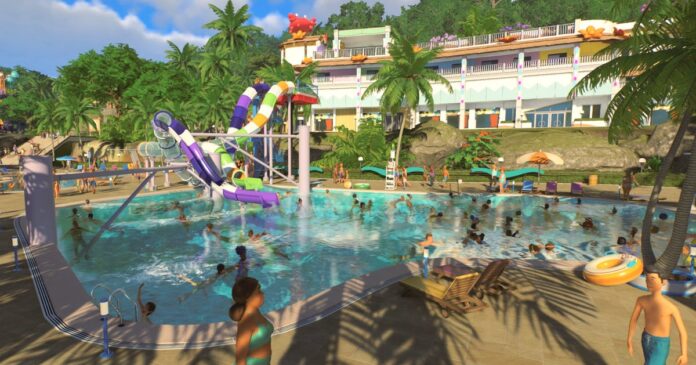Matt Wales
Curated From www.eurogamer.net Check Them Out For More Content.
Planet Coaster 2’s flexible creation tools are as compulsive as ever, but the fun butts up against an exhausting UI, uninspired management gameplay, and conspicuous content gaps that feel like cynical spaces for DLC.
I bloody love a theme park: the sights, the smells, the gleeful screams, the sense of utter transportation. But most of all, I love the breathless clash of science and art behind these thoroughly encompassing illusions. I’m the kind of theme park nerd who still gets genuinely giddy when they see technology and creativity crash together like this, and who’s been daydreaming their perfect rides and coasters into existence since a run-in with Disney’s Haunted Mansion at the age of three became a bit of an obsession. For people like me, the original Planet Coaster was a dream. For all its flaws, it was a brilliantly implemented, beautifully presented suite of creative tools capable of turning theme park flights of fancy into digital reality, and its sequel promises the same, but more.
Like its predecessor, Planet Coaster 2 is an immediate head turner; a glorious fusion of art, animation, sound, and music that brings those creative whims to wonderfully convincing life – a world of whirling metal, blinking lights, and the delighted screams of guests, to be experienced on high or at ground level. Strip away the presentational pizzazz, of course, and Planet Coaster 2 remains indebted to Chris Sawyer’s seminal RollerCoaster Tycoon, barely straying from the template established over a quarter of a century ago. It’s a game built around the intricacies of park management; of hiring staff, constructing rides, and providing key amenities – all to please guests and make enough profit that the operational loop can continue indefinitely. But once again, Planet Coaster 2’s real strengths lie in the depth, breadth, and flexibility of its design and customisation tools.
This is a sequel of gentle evolution rather than sweeping reinvention, which isn’t to say its refinements aren’t immediately apparent – Frontier has clearly listened to feedback from Planet Coaster 1, even if it feels like its most notable improvements are specifically catered toward the YouTube content creator contingent with days to spend fashioning their marvels of intricate design. Its new lighting engine, for instance, isn’t just pretty, it’s practical; enclosed spaces are actually dark, meaning proper dark rides are finally possible without clunky workarounds.
Then there’s the optimisation. Unlike its notoriously spluttery predecessor, Planet Coaster 2 is far more capable of keeping up with players’ creative whims without immediately turning into a slideshow. Track ride construction generally feels less fiddly; flat rides can now be stripped back and fully themed with décor pieces – invaluable for those wanting a more cohesive aesthetic flow across their parks – while seemingly minor additions such as object-scaling and scenery brushes are major game changers. Elsewhere, pools and flumes have been introduced, satisfying the endless clamour for water parks among the community.
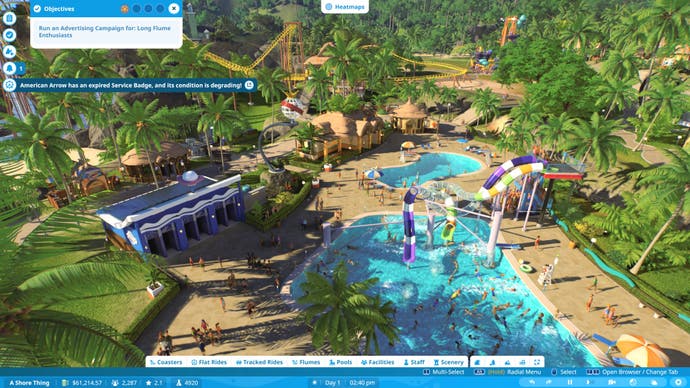
Planet Coaster 2’s various play modes are more clearly defined now, too. There’s a campaign mode, for instance, that goes to some entertainingly weird places as it cheerfully turns the fundamentals of park building into objective-based challenges. That said, its tendency to prioritise dad-tier jokes over helpful explanations – and the frequency with which any attempts at creativity butt up against arbitrary limitations – make it a bit of a drag. There’s also a Franchise mode, enabling players to work together, clan-like, in a globe-spanning grasp to top the leaderboards by satisfying weekly challenges, and there’s support for asynchronous co-operative building, too. Finally, for those simply wanting to maximise their creative freedom, there’s a highly customisable sandbox mode, enabling players to shift the balance between park management and design as they say fit.
What Planet Coaster 2 lacks, though, is any meaningful strategic evolution or sophistication. It jettisons some of its predecessor’s mechanical breadth too, with the likes of restaurants, hotels, and security all now inexplicably removed. The original Planet Coaster was, of course, a desperately uneven affair, its powerful creation tools massively overshadowing an anaemic management core, and it’s disappointing – if perhaps not especially surprising – to see those weaknesses carry over to the sequel. It might feature a checklist of new management options – from water filtration to power distribution – but the implementation is uniformly superficial. Even water parks, Planet Coaster 2’s flagship new feature, just sort of exist – a couple more holes to dig, staff to employ, and rides to build – with little in the way of extended integration.
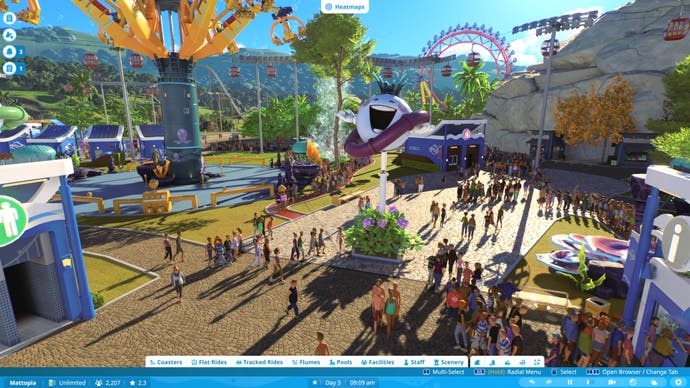
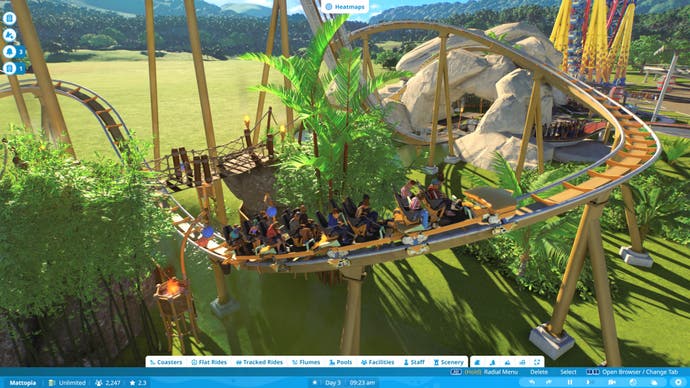
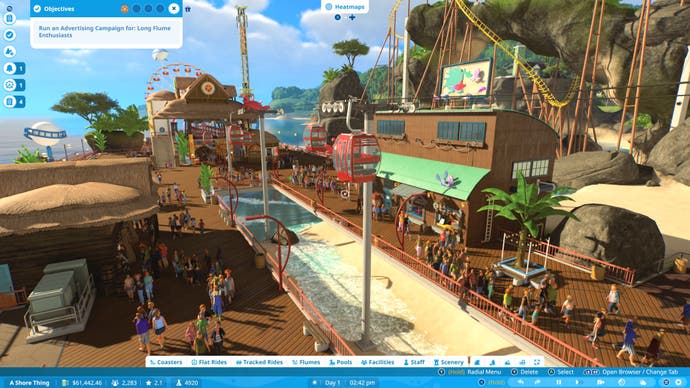
For all its building refinements, Planet Coaster 2 feels like it marginalises its management side even further, its two halves co-existing, occasionally intertwining, but never in particularly interesting or convincing ways. It’s a backward step compared to Frontier’s wonderful Planet Zoo, which struck a compelling balance between park management and beautification. And it’s especially weak in comparison to Texel Raptor’s Parkitect, created with a fraction of Frontier’s resources, which despite ostensibly being a retro throwback, felt like a genuine evolution of the classic theme park sim formula. Parkitect’s canny logistical layer of goods distribution, meaningful distinctions between ‘backstage’ and ‘front of house’, not to mention its impactful weather system, all brought a genuine sense of strategic cohesion between its two halves. By comparison, the handful of elements that Planet Coaster 2 does borrow from Parkitect – weather and scenery scoring – feel dramatically underdeveloped and awkwardly siloed.
Even more so than the original, Planet Coaster 2 feels like a game for the builders and tinkerers, the look-what-I-made content creators, and that’s perfectly fine, even if it does feel like a missed opportunity. Frontier’s sequel has the same unquestionable kind of hypnotic allure as its predecessor when it comes to building and design – arguably even more so, given its multitude of toolkit refinements – hours vanishing in a happy haze of meticulous rock placement, or in getting the banking sweep of your brand-new coaster just so. The trouble is, for all it gets right, Planet Coaster 2 often feels strangely retrograde – cumbersome, counterintuitive, or just plain contradictory – with an infuriating knack of getting in its own way.
Simply navigating menus is often an exercise in fiddly frustration, with Frontier’s attempt to design an interface that works for both keyboard and mouse and controllers never quite working for anyone. Menus are unintuitively organised, key information is often missing or obscured through poor or inconsistent presentation, advanced settings frequently remain unexplained… On it goes in a similar slapdash fashion. Why, for instance, does the Workshop not have a filter for flat rides, of all things? Individually, these feel like surmountable quirks, but all together they’re just draining.
It doesn’t help either that feedback is often so poor, even contradictory, that it’s hard to tell what’s a failure on your part or a failure of the game. “Staff are trying to access a staff building which is at full capacity”, I am informed at one point, quickly followed by the message, “There is no staff building”. Encouragingly, Frontier has already started to address some of Planet Coaster 2’s more egregious issues, with more substantial tweaks coming in December, but it’s still hard to shake the sense of backward slides elsewhere.
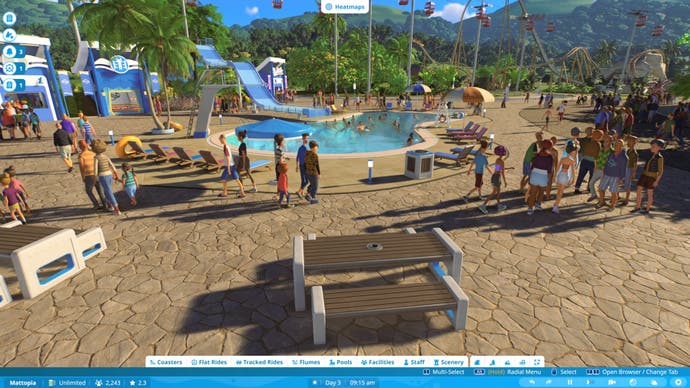
Sure, the ride selection is genuinely great, with some wonderful titillating flourishes – tilting coaster platforms, backward flumes, oh my! But as easy and enjoyable as it is to build the ‘park’ bit of your theme park, Planet Coaster 2 seems to flounder on theme. Gone are the visually distinct archetype themes seen in the original game – pirate, sci-fi, spooky, and western. Instead, replaced by far less distinct options: aquatic, mythology, Viking, tropical resort, and cheerily corporate. It’s a mix that results in a sort of bland sludge of vaguely vacation-themed visuals – part holiday resort, part generic amusement park – that don’t exactly sizzle with creative potential. Furthermore, Planet Coaster 2’s building blocks leave a lot to be desired, pre-built decorations, animatronics, and in-house scenery blueprints all in decidedly short supply.
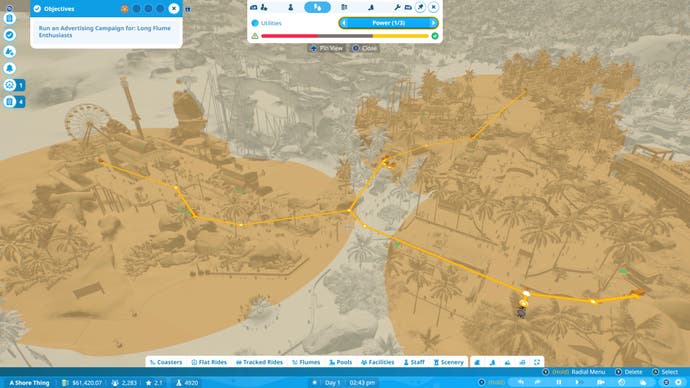
After a few hours in the original Planet Coaster, I’d built a surprisingly elaborate Pirates of the Caribbean knock-off, complete with sword waving buccaneers, burning ships, and cannon balls splashing in the water; by comparison, the most exotic corner of my park in Planet Coaster 2 is a sad cave with a singing eel. Yes, it’s absolutely possible to improvise something more fantastical using geometric shapes and fiddly little props, but not everyone will want to go so deep into the tools. Of course, Planet Coaster 2’s new in-game Workshop means design-minded players can upload and share their creations with anyone hoping for a more casual play experience – but it all feels a little distasteful, as if Frontier’s offloading key foundational work onto the community. And Planet Coaster 2’s more conspicuous gaps feel even more cynical when they’re accompanied by £18 launch day DLC.
At its best, Planet Coaster 2 captures much of the magic of its predecessor, where immaculate presentation and powerful tools manifest a game of endless creative potential. But its undoubted pleasures are haunted by interruptions and frustrations, missed opportunities, and just far too many conspicuous holes where it feels like something vital should be. There’s a chance things will improve as Planet Coaster 2 evolves, but right now, for all its core refinements, it often feels lesser than its predecessor in too many ways.
A copy of Planet Coaster 2 was provided for review by Frontier Developments.

